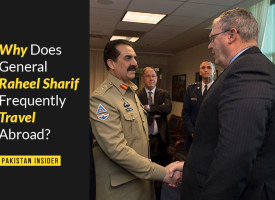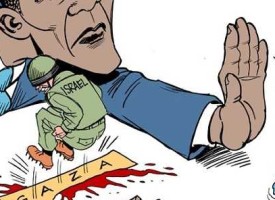The post 9/11 world is defined by mastery of deception, propaganda or what most call the mastery of narrative projection. Whoever achieves dominance of a particular incident through manipulative views and opinions wins the race. We have long seen how mass media has been used as a “soft power” tool to influence opinions in favor of, or against, a specified entity. In an insightful report for Robert Bosch Stiftung, ‘How Countries Use the Media as a “Soft Power”’, Dima Romashkan interviewed experts from BRICS countries (except Brazil) on how strategic communications tools can effectively articulate national interests abroad. It makes for a very interesting context to the subject of this artice.
The Western world has traditionally had the authority to circumvent diverging world views and ultimately bring them in its favor. To this end, their government narratives are by and large supported unquestionably by the plethora of private media corporations and broadcasting agencies. This ability to sway public opinion according to state requirements sets the ground for justification and legitimacy of wars overseas. Take the example of the US military’s infamous Operation Neptune Spear in Abbottabad, Pakistan. To this day, no one has seen evidence of Osama bin Laden’s presence in the compound but the power of Western media and its influence among policy circles presented it as some sort of divine truth. The list can go on and on.
The point is, it is not difficult for nation-states to influence audience perception as long their target audience and modes of engagement are well-defined before execution. In military parlance, this process is referred to as Information Operations (tactical). On a national level, this assumes the status of nation-sponsored Information Warfare, which is strategic by nature; it involves the integration and subsequent use of all print and electronic media to deliver a whole-of-means approach in getting the intended message across. The results of a campaign on a given trend are then analyzed to note any discrepancies and shortcomings.
The past few years though, have witnessed the emergence of competing narratives. The West is being signaled that it no longer calls the shots on the global matrix of perceptions. A timeline of some prominent state-sponsored media groups alongside their brief summary is as follows:
2000
- Launch of English language “CCTV News” in September 15, which emerged from CCTV International to project the national narrative of the Communist People’s Republic of China. This was followed subsequently by the launch of CCTV America 0n September 6, 2012 and CCTV Africa on October 11, 2012. The Chinese have made successful inroads into the English audience in the self-assumed superpower US and the mineral-rich continent of Africa.
2005
- Launch of “Russia Today” on April 6 now known popularly as “RT”. The channel also operates news services in Spanish, Arabic, German and French.
2006
- Launch of “Al Jazeera English” on November 15, established and used by Qatar’s ruling family to subtly explain their policy perspectives through a variety of programs and project state interests both at home and abroad. Additions include Al Jazeera Balkans (launched on November 11, 2011) and Al Jazeera America (launched on August 20, 2013).
- Launch of France’s channel “France 24” on December 6, 2006 with services in native (French) and Arabic as well.
2007
- Launch of Iranian regime-sponsored “Press TV” on July 8, an English language news and documentary TV channel, affiliated with the Islamic Republic of Iran Broadcasting (IRIB).
2009
- Transformation of Japan’s “NHK World” into a global news channel in February with a primary focus on Japan and its interests both at home and abroad. Almost its entire content today aired in English.
2015
- Launch of a 24-hour English language German state news channel Deutsche Welle TV (“DW News”) on June 22, 2015. Somewhat of a new arrival, the service had been broadcasting in English since the ‘50s but a complete makeover and requirement for a round-the-clock English narrative of German national perspectives led to its formation.
To understand the necessity of state-sponsored international news channels better, let us revisit the monumental declaration of the French government in 2003 which called for offers to:
“Elicit the development of an international news channel. Broadcasting primarily in the French language, this service will assure a more important and more visible presence of France in the worldwide battle of images, and to contribute to the pluralism of international information by offering to our viewers the choice of a different viewpoint on the news, marked by a singular point of view of our country on world affairs, by its culture and by its own ideas, and to value its historical links and its privileged geography. The international news channel must contribute to a long-lasting strategy of influence of France in the world”.
Similarly, Margarita Simonyan who served as the pioneering Editor-in-Chief of RT said the objective of the channel was to “reflect Russia’s opinion of the world” and “present a more balanced picture of Russia“.
In 2013, the BBC had acknowledged that it was facing stiff “soft power” competition from what the report described as “ambitious players that have seriously upped their game – notably al-Jazeera, RT (Russia Today) and China Central Television (CCTV)”.
With the provision of the right tools, even less-experienced but enthusiastic state-supported media crew members can work wonders. The secret lies in technical sophistication (live streaming, radio broadcasting, online tweeting), audio/visual innovation (sleek, high-definition graphics, crisp audio) and content development (news, documentaries, etc).
Pakistan – The Situation Is Still Grim
The state-run Pakistan Television Network (PTV) launched an English-language news channel “PTV World” on January 29, 2013. The slogan proclaims “Changing Perspectives” but nothing could be far from the truth.
For starters, the channel has sub-standard graphics, visibly weak green-screen setup facility, distorted audio quality and some of the most monotonous content you can expect to find. At most, a major portion of the channel’s programming either features quotes by notable global personalities, documentary films by the military mouthpiece ISPR or shows discussing routine domestic politics. Barring a few exceptions such as the programs ‘Defence & Diplomacy’ and ‘Diplomatic Enclave’, there is nothing ‘national’ about this channel. It does not help project a Pakistani worldview to the global audience, let alone properly showcase local culture. Compare this with, say, NHK World which runs a variety of programs giving viewers in-depth knowledge of Japan’s historical and cultural legacy.
Funny enough, where state-sponsored international news channels promote learning of their respective national languages in between their broadcasts or on their websites, PTV World does the exact opposite. It has programs teaching users how to improve their English, instead of Urdu. This lack of responsibility and carelessness is resulting in unnecessary wastage of taxpayer money. To top it off, PTV World gives focused coverage to the ruling government and its leader instead of building upon a national narrative, across the divide of political parties.
Pakistan witnessed a boom in the private media industry during and after the Musharraf period. A dearth of news channels in Urdu and other languages/dialects cater for their target audience. If assessed honestly, PTV World targets the Pakistani population at home and abroad and does not address non-Pakistanis. This is the crux of the problem which should be addressed on emergency grounds.
Now more than ever, we need to project or ‘push’ a national narrative to the world which keeps highlighting our sacrifices against terrorism, to counter the influence of anti-state elements internationally, to prevent India and other adversaries from creating controversies around Pakistan’s bilateral ties with US, China, etc and present a vibrant, positive and modern image of Pakistan.
In the battle of perceptions, Pakistan has shut its external attention and is content in its inner (internal) circle. Why then, do we complain to the world about being ‘misunderstood’?
image credit: washingtonpost.








No comments!
There are no comments yet, but you can be first to comment this article.